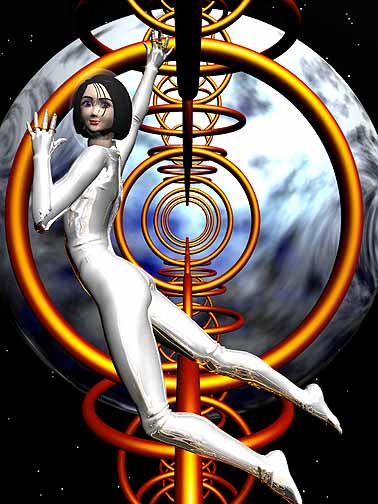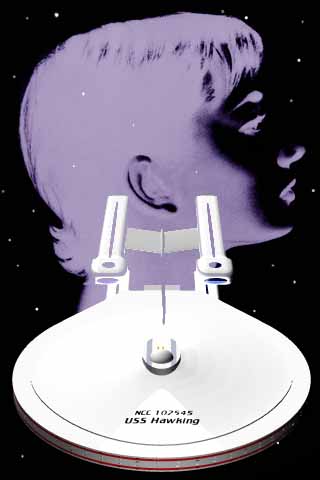 |
 |
Three
Rings for the elven kings, under the sky
Seven for the dwarf lords, in their halls of stone
Nine for mortal men, doomed to die
and one for the Dark Lord, on his dark throne
in the land of Mordor, where the shadows lie
One Ring to rule them all, One Ring to find
them
One Ring to bring them all, and in the darkness bind them
in the land of Mordor, where the shadows lie
The shape of things to come...
If you are just looking to find the ring control box for the ring you came in on, or get back to an article attached to a ring...
If you a true ring fanatic and want to learn more about my site structure and statistics...
The basic structure of Warp Nine Flying False Colors, or lack thereof, was set long before I started attaching to web rings. Flight by Committee, USS Massachusetts, Recognizing the Battle Flag, An Android's Tale, Polyticks, Visions, and the Image Gallery existed long before I joined a single ring. Still, the various chapters are so different that joining one ring seemed implausible. Thus, I am attaching each chapter to the one or two rings most appropriate. While the navigation bars and teaser pages of each chapter contain links to all the other chapters, each chapter is designed to stand entirely on its own.
Once in a while I scan the web for my own footprints. Who out there has linked into my pages? Most links in have been routine. I discovered my "Right to Bear Arms" page is being used as an example of either a good, bad, or ugly page. I'm not quite sure which. However, one web critic, Daniel Radosh, a sometimes contributor to the New York Times, was quite clear in his opinions of Joy Mudd, an android character I role play in AOL's Star Trek simulation games. I won a place on a long list of… well… let Daniel speak.
When it comes to all the Star Trek sites on the World Wide Web, it would be easy to indulge in cheap shots. So that's what I'm going to do...At the Terry Farrell (a.k.a. Lieutenant Jadzia Dax) page, six volumes of photos prove that the Deep Space Nine star is the blandest model/actress ever to be palmed off as a sex symbol, and no amount of fan testimony can persuade that she is "the greatest actress ever to grace the screen." More confusing is "Dr. Julian Subatoi Bashir, This Is Your Life", a page dedicated to fan fiction about the DS9 character's youth. "Stories are pretty angsty," admits the editor, "filled with visions of a terrible childhood, lost siblings, a cruel or just plain negligent father." I don't even want to know about the story "Jenny," in which "a twelve-year-old Julian has to watch after his little sister." I just hope it's not one of those slash stories you hear so much about
But at least these are major players. What really makes no sense are the sites devoted to minor characters like Ro Laren or really minor characters like General Chang or, let's just say it, nonexistent characters like Joy Mudd. To the extent that she is anything at all, Joy Mudd is an Android inspired, her creator claims, "by the "I Mudd" episode of the original Star Trek Series, Data's emotion chip, Azimov's Laws of Robotics, and Holly Golightly." The earth trembles as Gene Roddenberry, Isaac Azimov, and Audrey Hepburn all roll over in their graves simultaneously.
There was considerable more directed at numerous other sites, much in the same tone.
I'm not worried about the ghosts of Gene or Isaac. I'm doing science fiction, not space opera, exploring a little further some of the ideas made famous by these two. Gene placed a lot of emphasis on his Prime Directive, the noninterference principle. The "nor through inaction" clause of the Asimov's First Law of Robotics requires action to preserve lives, and thus directly conflicts with the noninterference principle. Asimov's Second Law requiring obedience raises the specter of slavery, and conflicts with Roddenberry's Guarantees of the rights of Federation citizens. Joy also introduced me to the question of whether one can be sentient without having free will. Can beings compelled to obey laws and obey orders be considered sentient? Asimov's Third Law requires Joy to care for her own health and life at Priority Three, while the First Law impels her to care for the health and lives of others at Priority One. Fed through the emotion chip, this gives Joy an irrational but deeply programmed doubt her own worth. A few months after putting Joy into play, I'd discovered I'd programmed some of the most basic principles of western ethics through an emotion chip, generating a flawed character who cared deeply about life, law and freedom. Given Joy's programmed Priorities, she could uniquely solve most ethical problems, leaving her player very aware that her answers would radically change should her Priorities be shifted. Still, it took a while longer for the major design defect in mixing the Laws of Robotics and emotion chips to surface fully.
If you program absolute moral laws through an emotion chip set to compel complete obedience to these laws, one gets a fanatic. No matter how proper this set of moral laws is, and how correctly or incorrectly they are prioritized, zealotry is unacceptable. Inflexible rules fed through an emotion chip at high gain yields disaster. It is possible to care too much. In playing Joy, more important than the Guaranteed rights of sentient beings, more important than the Prime Directive, more important than life itself, is to remember always one is playing an Audrey Hepburn character. No matter how strong one's moral imperatives, no matter what the immediate consequences, one should act always with grace, humor, and class.
Is Audrey rolling over in her grave? Perhaps. But she was always the actress, and always a merchant of dreams. How many times did Audrey walk past Audrey clones on the street, her wannabe twin wearing a big hat, big sunglasses and a little black dress décolleté Sabrina? How many times did Audrey keep a straight face, or just smile an Audrey smile? Would one who deals in dreams tread on the dreams of others? Oh, yes. She might have been dismayed at Joy. My efforts are unworthy, and Joy will never be Audrey. But Audrey would be rolling in her grave as she lived, causing not the earth to shake. Even in death, she would roll over with grace, humor, and class.
There are hazards to being a dreamer. If one dreams true, the dreams are shared. Gene, Isaac and Audrey dreamed true, each in their own way. If one does not share these dreams, there is no need to browse the Star Trek web ring, or the Audrey Hepburn ring, or the Buffy the Vampire Slayer ring, or the General Hospital ring, or the NASCAR racing ring, or the any of the other web efforts that fans of all types are sharing. If one does not see the point of dreams, don't follow them, but do not presume to speak for the dreamers.
There is room in cyberspace for dreams.
 |
![]()